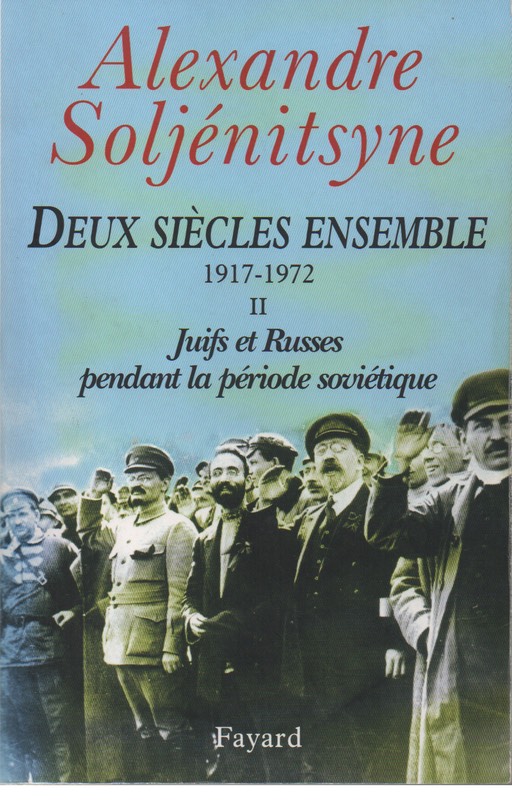THE FEBRUARY REVOLUTION
But to go back to the Ukrainians. At the bottom of the heap there is still the peasantry speaking its distinct Ukrainian language. A Ukrainian intelligentsia with a lively interest in Ukrainian traditions and culture has emerged, largely inspired by the example of Taras Shevchenko and his glorification of the Cossack past. But they have great difficulty making contact with the substance of the distinct Ukrainian people - the peasantry - because the government forbids the publication of popular educational material in the Ukrainian language. As a result the idea of a 'Ukrainian nation' has not struck root among the peasantry. (11) The peasantry, overpopulated, scratching a living out of ever diminishing plots of land, is still reliant on Jewish middlemen for essential supplies and selling their surplus grain and are often in debt to them in circumstances in which the Jews themselves are barely able to make a living. This all feeds into what was the climax of this particular cycle of attacks on Jews in Ukraine, in the aftermath of the February Revolution of 1917.
(11) I discuss this and the difference in this respect between Galicia under the Austrians and Ukraine under the Russians at http://www.peterbrooke.org/politics-and-theology/solzhn/ukraine/ukraine-3/class.html
The February (Julian calendar, March in the Gregorian calendar) Revolution opened up the possibility of a 'black repartition' in which the peasantry would at last be able to get the land they were working under their own control. So far as I can see there was a difference between the landholding system in Ukraine inherited from Poland and that in Great Russia. In Ukraine although the land was owned by the landlord, the peasant farmer had plots of land which they could regard as their own so long as they worked, say, three days a week on the land controlled by the landlord. It was in these conditions that the Jews as middlemen acquired such importance. In Great Russia the estates were organised as largely self managed and self sufficient communes providing for themselves most of the services provided in Ukraine by the Jews. This of course is a gross oversimplification but it helps explain why the Ukrainian peasantry were so much more committed than the Russian peasantry to the principle of private ownership. In Russia the lands worked by individual peasant-farmers were assigned by the commune and could be changed. And peasants could be assigned many of the other tasks which needed to be done. Hence 'Communism' seemed a less alien idea, even if many Russian peasants would have wanted to escape the commune.
A Ukrainian state was established in 1918 but it was a German protectorate and the Germans (and Austrians) were there in order to obtain grain to feed their own people, subject as they had been for four years to a British naval blockade. The result was an emerging state of war between the peasantry and the government over grain requisitions. The situation was hardly improved when the Germans left after their defeat in 1918 and the whole area became a war zone between the pro-Bolshevik Reds, the anti-Bolshevik whites and an army claiming to represent the Ukrainian national idea, led by Simon Petliura. The peasants, many of whom had only recently fought in the Russian army and had retained their weapons, formed into armed bands under the leadership of local 'atamans' - a term remembered from their Cossack days. There was a movement calling themselves 'Free Cossacks'. And these armed bands had scores to settle with the Jews. Petliura's Ukrainian nationalist army was hardly distinguishable from the peasant bands. Hence the pogroms - deaths on a much larger scale than anything that had gone before - that were associated with his name. It seems extremely unlikely that he personally would have wanted the pogroms. He can certainly be accused of weakness in failing to prevent them but he had huge difficulty scratching any sort of army together never mind enforcing discipline on the people he had managed to get.
That, incidentally, was also Jabotinsky's view. Jabotinsky was a longstanding supporter of Ukrainian cultural autonomy. When, after his defeat by the Red Army and expulsion to Poland, Petliura was planning to return supported by Pilsudski, he invited Jabotinsky to join him with a Jewish police force that would be charged with preventing attacks on Jews. Jabotinsky agreed and for this was heavily criticised by his fellow Zionists. Jabotinsky in his autobiography refers to 'the agreement for which I was cursed in every corner of the Jewish world, and which I am willing to sign again' (12) though in the event Petliura's Polish supported return to Ukraine never took place.
(12) Vladimir Jabotinsky: Story of my life, translated from the Hebrew by Brian Horowitz and Leonid Katsis, Wayne State University Press, Detroit, 2016, p.138 in the Kindle version.
But what under these circumstances were the Jews to do? The one element which had a firm ideological opposition to 'antisemitism' were the Bolsheviks and they had a highly visible Jewish leader in the person of Leon Trotsky. Were they not the most attractive proposition? And did that not reinforce in the minds of their enemies the identification of Judaism with Bolshevism which was to become the leitmotiv of antisemitic rhetoric in the years that followed?

Trotsky with supporters
Cover of the French translation of Solzhenitsyn's Two Centuries Together